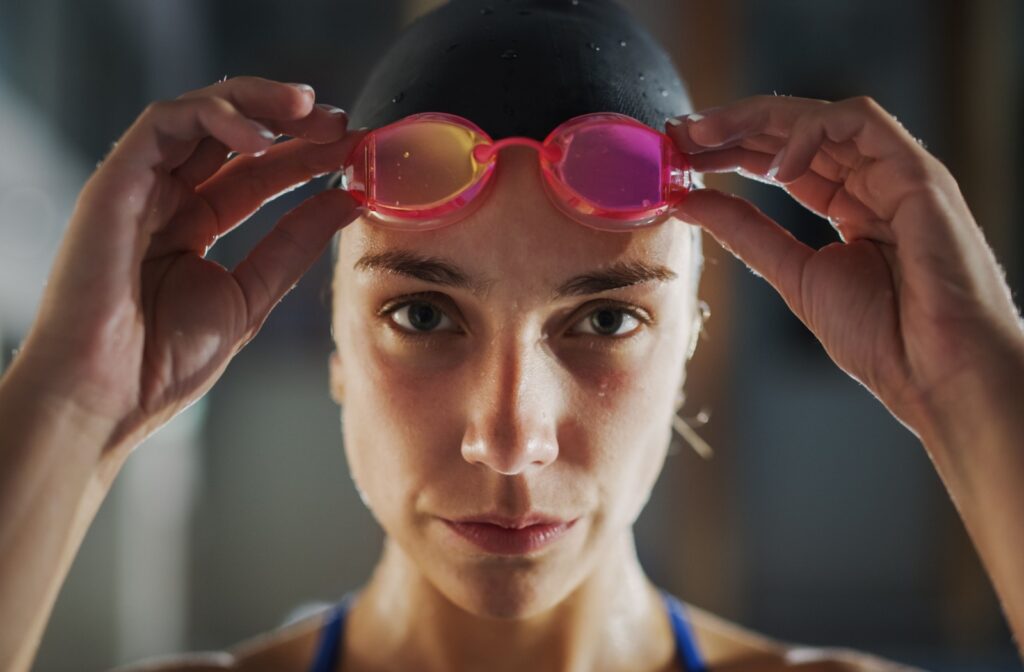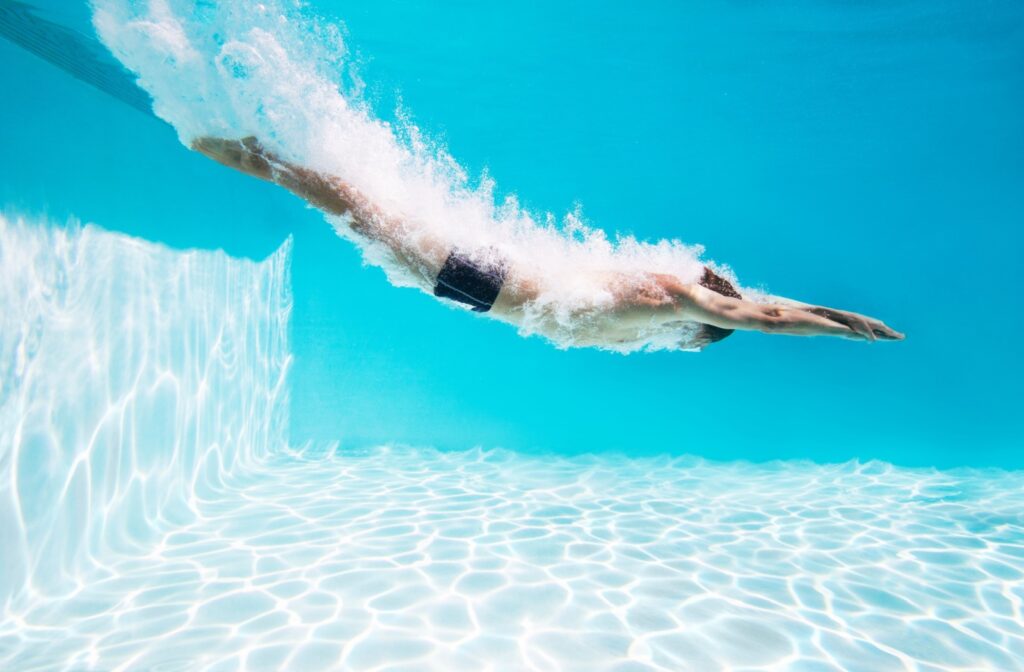Swimming pools are a perfect place for fun, exercise, and relaxation, but they can sometimes leave swimmers with an unpleasant side effect: chlorine in the eyes. If you’ve experienced that stinging, burning sensation, you know how uncomfortable it can be. The good news? It doesn’t have to ruin your day.
To get chlorine out of your eyes, rinse them with cool, clean water or use sterile saline solution to flush the chlorine out. If your discomfort persists long after leaving the pool, there may be something else affecting your eyes. Your eye doctor can help you sort out the cause and find relief.
Understanding Chlorine & Its Effects
Chlorine is a chemical commonly used in swimming pools to kill harmful bacteria and maintain water cleanliness. While it keeps pools safe, too much exposure to chlorine can irritate sensitive areas, especially the eyes.
This happens because chlorine strips away the natural tear film that protects your eyes. Without this protective layer, your eyes can become dry, red, and irritated. For some people, the effects may be mild, but for others, they can feel downright painful.
How Chlorine Affects Your Eyes
Prolonged or repeated exposure to chlorine can result in a range of uncomfortable symptoms such as:
- Redness or bloodshot eyes
- Stinging or burning sensations
- Dryness
- Blurry vision
- Sensitivity to light
The effects can vary depending on the chlorine levels and how long your eyes come into contact with the water.
Immediate Steps to Take After Chlorine Exposure
If you’ve just hopped out of the pool and your eyes are burning, don’t panic. Here’s how you can find quick relief in a few simple steps.
Step 1: Rinse Thoroughly with Fresh Water
One of the easiest ways to remove chlorine residue is by rinsing your eyes with cool, clean tap water. Simply splash water onto your eyes repeatedly or use an eye cup to gently irrigate them. Avoid rubbing your eyes, as this could worsen irritation.
Step 2: Use Artificial Tears
Over-the-counter artificial tears or lubricating eye drops can help restore moisture to your eyes and wash away any lingering irritants. Look for preservative-free options for the gentlest relief.
Step 3: Cold Compress
Place a cool, damp cloth over your closed eyes for 5 to 10 minutes. Not only is this soothing, but it can also help reduce redness and inflammation.
Step 4: Blink Frequently
Blinking helps restore your eyes’ natural tear film and promotes proper hydration. It’s an easy, natural way to bring relief after chlorine exposure.
Longer-Term Relief & Care
Sometimes, chlorine irritation can last beyond your first rinse. Here are some tips for caring for your eyes in the hours or days after your pool session.
Hydrate Your Eyes
Drink plenty of water to stay hydrated and promote tear production. You can also use your artificial tears throughout the day to restore moisture.
Wear Sunglasses
Bright sunlight can feel extra harsh on irritated eyes. Protect your vision by wearing sunglasses, especially polarized ones, to reduce glare and improve comfort.
Rest Your Eyes
Limit screen time and give your eyes frequent breaks if they’re feeling sensitive. Overexertion can worsen irritation.
Avoid Wearing Contacts
If you’re a contact lens wearer, switch to glasses for the next 24–48 hours. Chlorine residue trapped on contact lenses can prolong irritation. While we don’t recommend wearing contact lenses while swimming, if you have done so, replace them or clean them thoroughly after swimming.

How to Stop Chlorine from Getting in Your Eyes
The best way to deal with chlorine irritation? Avoid it altogether. With a few precautions, you can prevent discomfort and enjoy your time in the pool.
Wear Swim Goggles
Invest in a good-quality pair of swim goggles that create a watertight seal. Goggles are the easiest way to keep chlorine completely out of your eyes. If you need vision correction while swimming, consider using prescription swim goggles.
Use Eye Drops Before Swimming
Applying artificial tears before swimming can create an extra layer of protection for your eyes, keeping them more comfortable during your swim.
Shower Before & After Swimming
A quick rinse before entering the pool helps reduce the amount of organic matter (such as sweat or lotion) interacting with chlorine, while a rinse afterward helps wash away lingering chemicals.
Avoid Opening Your Eyes Underwater
If you swim without goggles, try to minimize opening your eyes underwater. Keeping them closed will reduce direct chlorine exposure.
Don’t Wear Contact Lenses While Swimming
Wearing contact lenses in the pool can be a risky move. Water, whether it’s in a pool, lake, or ocean, can carry bacteria and other harmful microorganisms that may get trapped between your lenses and your eyes. This increases the chance of infections, irritation, or even more serious conditions like corneal ulcers.
When to See a Doctor About Chlorine Irritation
Most cases of chlorine irritation resolve quickly with at-home care, but there are times when medical attention is necessary. You should visit your eye doctor if you experience any of the following symptoms:
- Persistent or worsening redness and pain
- Blurred vision that doesn’t improve
- Excessive tearing or discharge
- Any signs of infection such as swelling or yellowish discharge
It’s always better to err on the side of caution when it comes to your eyes. Persistent symptoms could signal a more significant issue, like conjunctivitis or a corneal abrasion, requiring medical treatment.
Protect Your Eyes Before Your Next Swim
Chlorine may be essential for clean pools, but it shouldn’t come at the expense of your comfort. Whether it’s rinsing your eyes immediately, using artificial tears, or investing in a good pair of goggles, there are plenty of ways to protect your eyes and keep them healthy.
If you’re still experiencing irritation or need advice tailored to your needs, book an appointment with Total Vision San Clemente. Our team of caring eye specialists can help you maintain healthy, happy eyes for all your adventures.




